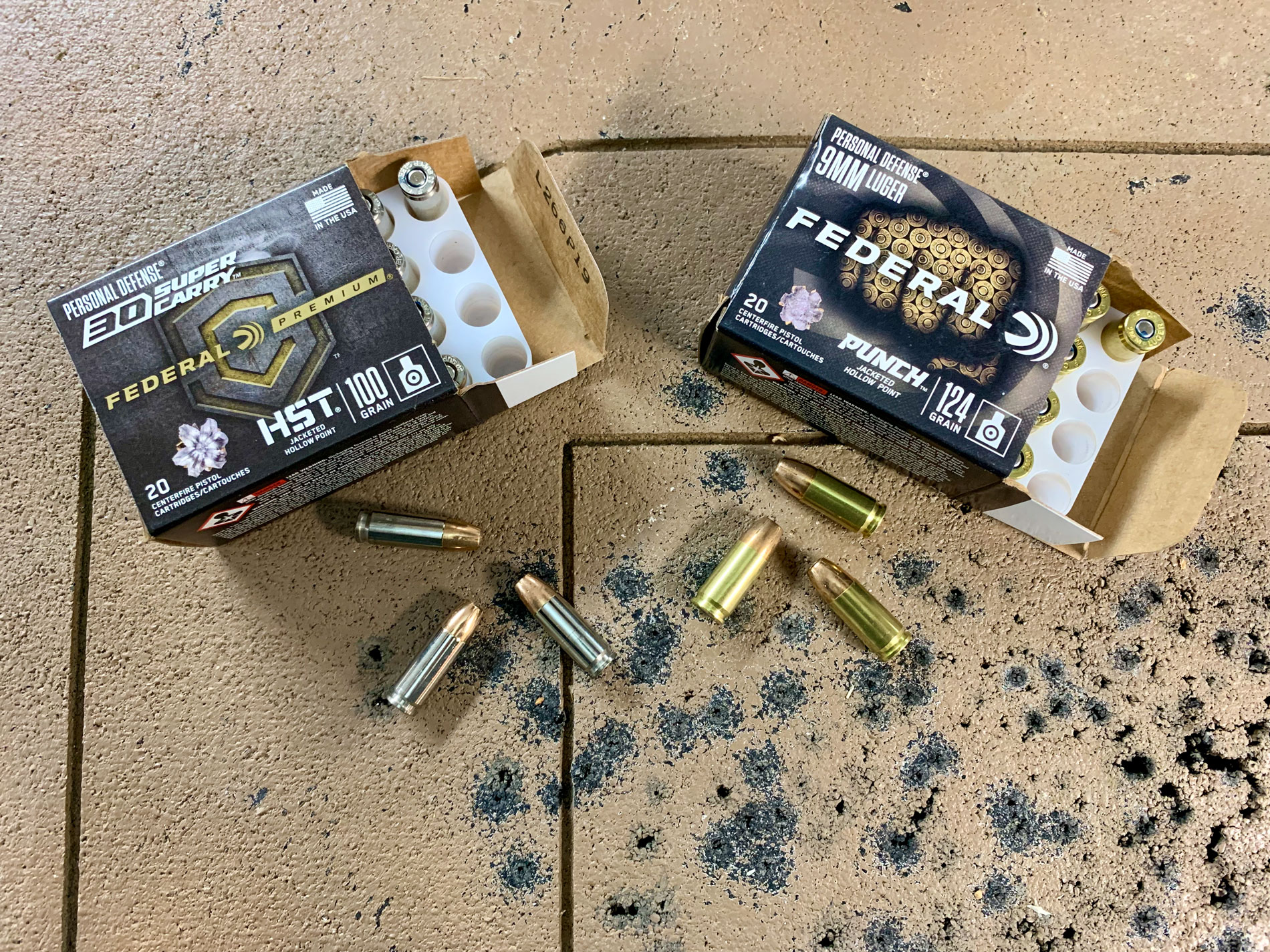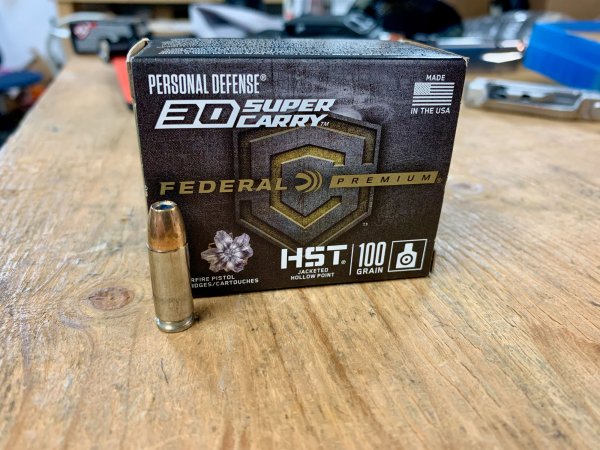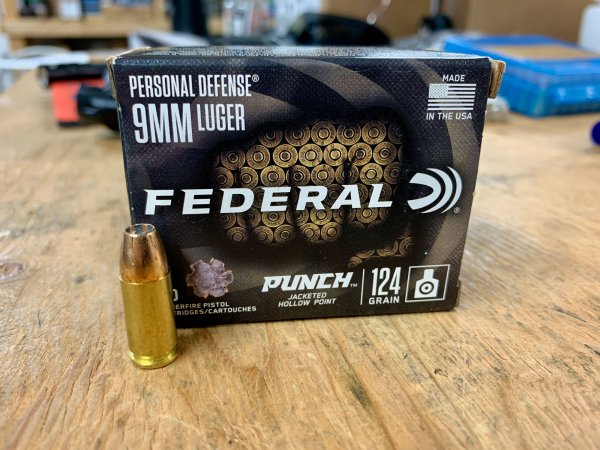We may earn revenue from the products available on this page and participate in affiliate programs. Learn More ›
Concealed-carry and defensive handguns are two of the hottest categories among shooters and gun enthusiasts, which should create fertile ground for niche cartridges like the .30 Super Carry to challenge the well-established 9mm — but it’s not quite that simple. Federal introduced this cartridge in early 2022, but it has yet to gain a firm foothold in the market that is otherwise gobbling up every new advantage presented to shooters. We’ve seen an explosion of sub-compact and micro-compact defensive pistols that maximize capacity while being easy to carry and shoot accurately.
You might ask, is the .30 Super Carry an objectively better carry cartridge than the 9mm? Does the 9mm have advantages over the .30 Super Carry? Are both cartridges good options? The answer is yes. When considering 30 Super Carry vs 9mm, it’s important to understand their relative strengths and limitations, and the conclusions might not be as cut and dry as you think.
30 Super Carry vs 9mm: Technical Specs
The first step in determining whether the .30 Super Carry is worthy of replacing the 9mm as a carry gun cartridge — or not — is understanding what it is and what it can do. Here’s an apples-to-apples comparison of flagship Federal Premium HST defensive loads for both .30 Super Carry and 9mm.
| 30 Super Carry | 9mm Luger | |
| Bullet Diameter | .312 | .355 |
| Bullet Weight | 100 grains | 124 grains |
| Max Pressure | 50,000 PSI | 35,000 PSI |
| Muzzle Velocity | 1,250 fps | 1,150 fps |
| Muzzle Energy | 347 ft-lbs | 364 ft-lbs |
| Expansion Diameter | .530 inches | .571 inches |
| Penetration Depth (Heavy Clothing Protocol) | 15.5 inches | 14.5 inches |
Face Value and Practical Value
When comparing the most similar bullets and loads, the .30 Super Carry essentially equals the 9mm in terminal performance — even beats it in some ways. It’s a cartridge that allows greater magazine capacity and less felt recoil with relatively equal performance. At face value, it’s objectively a better concealed carry gun cartridge.
The most influential component that makes the .30 Super Carry a great cartridge is also what makes the 9mm such a tough competitor: bullet technology.
In times past, if poor results were witnessed with a handgun cartridge, the solution was to make it bigger. That’s how we got the 10mm Auto and .45 ACP, and many people still cling to that mentality. The underwhelming truth is that none of these handgun cartridges pack that much wallop. With more primitive bullets, perhaps the marginal increase in power was worth the cost of reduced capacity and practical accuracy. That is not the case today.

As detailed in the story by OL Shooting Editor John B. Snow, The .45 ACP vs. 9mm Cartridge Debate: Does It Really Matter?, modern defensive bullets have elevated the 9mm Luger to essentially the same performance levels as the .45 ACP and the struggling .40 S&W. The 9mm allows increased ammunition capacity and is easier to shoot accurately, while delivering similar terminal performance with good bullets. It’s no wonder that most law enforcement agencies and militaries have ditched larger cartridges to adopt the 9mm. In practical application, it’s simply a better choice for most shooters.
If the .30 Super Carry is objectively a better cartridge at first glance, why might it not be universally better? Though it offers great performance and speculative potential, it has a mountain to climb to rival the 9mm in real-world practical value.
30 Super Carry vs 9mm: Pros and Cons
Deciding between two good options is always tough, and breaking down the advantages and disadvantages of each option is nearly always helpful. There is no universal right choice, but in the case of 30 Super Carry vs 9mm, the details make all the difference.
.30 Super Carry
Pros
- Smaller diameter allows for increased capacity in magazines
- Bullets offer 9mm-equivalent terminal performance
- Softer recoil impulse, easier to shoot accurately
- Higher pressure and lighter bullets would work very well with a compensator
Cons
- Limited ammo options
- Very limited pistol options
.30 Super Carry Advantages: What Could Be Versus What Is
If we were starting with a blank slate, I would almost certainly choose the .30 Super Carry over the 9mm. It would give clear advantages in micro-compact pistols like the Sig P365, Springfield Hellcat RDP, or the larger Walther PDP F and Glock clones like the PSA Dagger. With a total capacity of probably 20 rounds in a pistol like my EDC, the Staccato CS, it would be an absolute buzzsaw.
There are good options for .30 Super Carry defensive ammo, but few of them. Federal, Remington, and Speer (all part of the Kintetic Group family of brands) offer JHP loads with comparatively similar performance, and they cost about the same as premium 9mm defensive loads. Being a hand loader, I would search out barrier-blind bullets like the Lehigh Defense Extreme Defense that would likely deliver better velocity and terminal performance. Lehigh currently offers a couple .312-inch bullets that are geared toward revolver cartridges like the .327 Federal, and I’m not sure how well they would function in the .30 Super Carry.

Many micro-compact and compact pistols are incorporating muzzle compensators these days, and I think the .30 Super Carry would work extremely well with them. Just like I found in my recent testing of the Sig Sauer XTen Comp in 10mm, lighter bullets with higher pressure behind them result in reduced recoil when fired through a good compensator. The light 100-grain bullet propelled by 50,000 PSI from the .30 Super carry would make a compensator work even better than just about any 9mm load. The result would probably be an unimaginably flat-shooting pistol.
Ultimately, these perceived advantages have yet to be realized. There’s only a handful of production pistols being chambered in .30 Super Carry after two years on the market. Unless you really like the Smith & Wesson Shield Plus or EZ, or are seriously looking at the Avidity Arms PD10, you’re going to have to keep dreaming. We did shoot the .30 Super Carry in the svelte Nighthawk Custom President at our 2022 Gun test, but single-stack dentist-grade pistols aren’t really where the .30 Super Carry is meant to shine.
9mm Luger
Pros
- The 9mm is the current standard of performance
- Good magazine capacity
- Most can shoot it accurately, soft recoil
- Nearly unlimited gun options
- Nearly unlimited ammunition options
Cons
- Old design that isn’t the most optimal
The 9mm is a 123-year-old worldwide powerhouse
It’s impossible to ignore the facts when weighing 30 Super Carry vs 9mm. The 9mm has some huge advantages when compared to the .30 Super Carry, and not a lot of drawbacks. In fact, the only relative drawback is that recoil is a bit sharper and capacity isn’t quite what the .30 Super Carry offers. That’s pretty much it. It might be a different story if both cartridges were starting out fresh, but the 9mm has been digging in since 1901 and is kept relevant through bullet and propellant technology.
The very things that make the .30 Super Carry a potentially great cartridge also make the 9mm better than it used to be. Good magazine capacity, manageable recoil, and terminal performance that hangs with larger cartridges are already things that we love about the 9mm. They give the 9mm clear advantages over larger cartridges like the .40 S&W, .45 ACP, and 10mm Auto. The difference isn’t so great when it comes to 30 Super Carry vs 9mm.
The 9mm Luger enjoys all the benefits of a 123-year tenure, including an unmatched selection of pistols to choose from and, usually, plenty of affordable practice ammo. Affordable FMJ .30 Super Carry ammo can be had for about 50 cents per round, but it simply can’t compare with the volume of the 9mm market. It’s common to find bulk 9mm 115-grain FMJ ammo for around 25 cents per round.

Final Thoughts on 30 Super Carry vs 9mm
Any company introducing a cartridge wants it to succeed, but I don’t think that Federal or anyone else expected everyone to abandon their 9mm pistols. What I really appreciate about the .30 Super Carry is that it breaks through the line and moves the ball down the field — even if only a few yards at a time. It capitalizes on the trends in handgun design, ammunition technology, and modern defensive shooting. It’s a cartridge that places a high value on accuracy, control, and maximizing capacity. I think that the .30 Super Carry’s fate ultimately depends on who will build guns for it and, so far, it’s spinning its wheels.
On a mass scale, the practical real-world advantages of the 9mm outweigh the potential and on-paper advantages of the .30 Super Carry for most shooters. If a Smith & Wesson Shield Plus is your favorite carry gun, I’d strongly consider it. If not, I wouldn’t be in a hurry to trade out your 9mm. I’m not planning on it.



